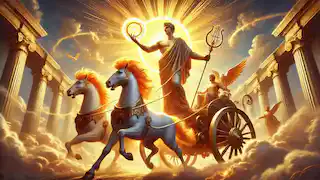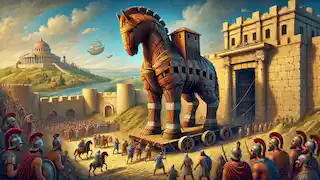In the ancient times, when the earth was young, and the world was filled with wonders and dangers, there existed the mighty gods who ruled over all of creation. These divine beings, known as the Olympian Gods, lived on Mount Olympus, the highest mountain in Greece, shrouded in mist and glory. They commanded the forces of nature, influenced the fates of mortals, and controlled the cosmos itself. But their rule wasn’t without challenge or turmoil. For the Olympians were as much like humans in their desires and ambitions as they were different in power.
This is the legend of the Olympian Gods, a tale of betrayal, love, war, and creation. The story begins with the primordial deities and carries on through the rise of the great Olympians. In the beginning, there was Chaos, a vast, formless void. From this void emerged Gaia, the Earth, the mother of all things. Gaia gave birth to Uranus, the Sky, and together they created the Titans, the Cyclopes, and the Hecatoncheires—giant beings with immense strength and many arms. However, Uranus was a harsh and domineering father. He feared his children and imprisoned the Cyclopes and Hecatoncheires deep within the earth. Gaia, heartbroken by the suffering of her children, conspired with her youngest Titan, Cronus, to overthrow Uranus. Armed with a sickle made from adamantine, Cronus ambushed his father and severed his power. From the blood of Uranus, the Furies and the Giants were born, while his severed form retreated to the heavens. Cronus took control of the world, ruling with his sister-wife Rhea, and together they birthed the next generation of gods. But Cronus was no better than his father. Having been warned by Gaia that one of his children would overthrow him, Cronus swallowed each child as they were born—Hestia, Demeter, Hera, Hades, and Poseidon—imprisoning them within his belly. But Rhea could not bear to lose another child. When Zeus, the youngest, was born, she tricked Cronus by giving him a stone wrapped in cloth to swallow. Zeus, hidden on the island of Crete, grew strong under the care of nymphs and later returned to confront his father. Zeus, with the help of Metis, a Titaness and goddess of wisdom, concocted a potion to force Cronus to regurgitate his siblings. Together with his brothers and sisters, Zeus waged a great war against Cronus and the Titans, known as the Titanomachy. The Cyclopes, grateful for their freedom, forged powerful weapons for Zeus and his siblings: the thunderbolt for Zeus, the trident for Poseidon, and the helm of invisibility for Hades. The war raged for ten long years, shaking the very foundations of the earth. Mountains crumbled, seas boiled, and the sky itself seemed to tear apart. But in the end, Zeus and his allies triumphed. The Titans were imprisoned in Tartarus, the deepest part of the Underworld, guarded by the Hecatoncheires. Cronus was dethroned, and Zeus became the king of the gods. With his victory, Zeus divided the world among his brothers. To Poseidon, he gave the sea, and to Hades, he gave the Underworld. Zeus kept the sky for himself, ruling as the supreme deity of Mount Olympus. The Olympian Gods were numerous, each ruling over different aspects of life and the natural world. While Zeus was the king of the gods, his family played crucial roles in the shaping of the human world and the divine order. Zeus ruled with a firm hand, controlling the skies, the weather, and justice itself. He was known for his many affairs with both goddesses and mortal women, which caused tension among the Olympians, especially with his wife, Hera. Hera, Zeus's wife and sister, was the queen of the gods. She was fiercely protective of marriage and often took vengeance on Zeus's lovers and their offspring. Despite her stern and vengeful nature, she was also a symbol of enduring love and loyalty. Poseidon, the brother of Zeus, ruled the oceans and all waters. He was both a giver of life, creating springs and streams, and a bringer of destruction, causing earthquakes and storms when angered. His temper was as turbulent as the sea, and he often quarreled with other gods and mortals. Hades, the third brother, governed the Underworld, a dark and somber realm where souls of the dead resided. Although he rarely left his domain, he was not evil, but just, ensuring that the dead were properly judged. His wife, Persephone, whom he had abducted from the world above, ruled beside him. Demeter, sister of Zeus, was the goddess of the harvest and fertility of the earth. Her most famous myth involves her daughter, Persephone, whose abduction by Hades caused the world to fall into winter as Demeter mourned her loss. The cycle of Persephone’s return from the Underworld each spring marked the renewal of life and the seasons. Athena, born fully armored from the forehead of Zeus, was the goddess of wisdom, warfare, and crafts. She was one of the most beloved deities of the Greeks, revered for her strategic mind and her role as protector of cities, particularly Athens, which was named after her. Apollo, the son of Zeus and the Titaness Leto, was the god of the sun, music, and prophecy. He was a patron of the arts and medicine, and his oracle at Delphi was one of the most significant religious centers in ancient Greece. Artemis, Apollo's twin sister, was the goddess of the hunt, the wilderness, and the moon. A protector of young girls and animals, she was known for her independence and strength. Artemis was often depicted with her bow and arrows, leading her nymphs through forests and mountains. Ares, the son of Zeus and Hera, was the god of war, representing the brutal and bloody aspect of conflict. He was often despised by the other gods for his savage nature, yet he was a necessary force in times of battle. Aphrodite, born from the sea foam, was the goddess of love, beauty, and desire. Her influence was powerful, capable of driving gods and mortals alike to madness for the sake of love. She was married to Hephaestus but had numerous affairs, most notably with Ares. Hephaestus, the god of fire and forge, was the master craftsman of the gods. Despite being born physically imperfect and cast out by Hera, he created the most magnificent weapons and armor for the gods. His forge, deep within the heart of volcanoes, was said to shake the earth when he worked. Hermes, the swift-footed son of Zeus and Maia, was the messenger of the gods. Known for his cunning and wit, he guided souls to the Underworld and was the patron of travelers, merchants, and thieves. His winged sandals allowed him to move between the realms of gods and mortals with ease. The Olympian gods were not just rulers of nature but also deeply involved in the lives of mortals. Many of the most famous myths involve the interaction between gods and humans, their loves, their quarrels, and the moral lessons they imparted. One of the earliest and most important myths involved Prometheus, a Titan who sided with Zeus during the Titanomachy. Prometheus, whose name means “forethought,” was known for his intelligence and his compassion for mankind. Seeing humans struggling in the cold and darkness, he defied Zeus and stole fire from the gods, giving it to mankind. Zeus was enraged by this defiance. As punishment, he had Prometheus chained to a rock, where each day an eagle would eat his liver, which would regenerate each night, causing endless torment. Eventually, Prometheus was freed by the hero Heracles, but the lesson remained: defiance against the gods could lead to severe consequences. Perhaps the most famous mortal to be influenced by the gods was Heracles, son of Zeus and the mortal woman Alcmene. Heracles, known for his immense strength, was driven to madness by Hera, and in his madness, he killed his wife and children. As penance, he was given twelve nearly impossible tasks, known as the Twelve Labors, by King Eurystheus. Heracles’ labors took him to the farthest reaches of the world, from slaying the Nemean Lion, capturing the Golden Hind, and cleaning the Augean stables in a single day, to retrieving the golden apples of the Hesperides and capturing Cerberus, the three-headed guardian of the Underworld. Heracles’ success in these labors earned him immortality and a place among the gods on Mount Olympus , where he was reconciled with Hera. Another tale heavily influenced by the Olympians was the Trojan War, a ten-year conflict fought between the Greeks and the city of Troy. The war began with the infamous Judgment of Paris, in which the Trojan prince Paris was asked to choose the fairest goddess between Hera, Athena, and Aphrodite. Each goddess offered Paris a bribe: Hera promised power, Athena offered wisdom and victory in battle, and Aphrodite tempted him with the love of the most beautiful woman in the world—Helen of Sparta. Paris chose Aphrodite, leading to the abduction of Helen and the outbreak of war. The gods took sides in the conflict. Hera, Athena, and Poseidon supported the Greeks, while Aphrodite, Apollo, and Ares sided with the Trojans. The war culminated in the famous episode of the Trojan Horse, leading to the fall of Troy and the eventual return of the heroes to their homes—some welcomed, others cursed. While the Olympian gods ruled for centuries, their reign was not eternal. As time passed, their influence waned, and new religions and philosophies emerged, leading to the decline of their worship. The rise of Christianity in the Roman Empire marked the end of the ancient Greek gods' era. Though the temples of the Olympians crumbled and their followers diminished, their stories lived on in the hearts of mankind. Even today, the legacy of the Olympian gods endures in literature, art, and culture. They are symbols of power, beauty, wisdom, and human nature—flawed, yet magnificent. The legend of the Olympian gods is not just a tale of divine beings controlling the world from a mountain top; it is a reflection of the human experience—our desires, fears, and ambitions. From the creation of the world to the rise and fall of heroes, the myths of the Olympians continue to captivate and inspire, reminding us of the eternal dance between fate and free will.The Creation of the World
The Rise of Zeus
The Olympian Gods
Zeus – God of the Sky and Thunder
Hera – Goddess of Marriage and Family
Poseidon – God of the Sea
Hades – God of the Underworld
Demeter – Goddess of Agriculture
Athena – Goddess of Wisdom and War
Apollo – God of the Sun, Music, and Prophecy

Artemis – Goddess of the Hunt and the Moon
Ares – God of War
Aphrodite – Goddess of Love and Beauty
Hephaestus – God of Fire and Craftsmanship
Hermes – God of Commerce and Messengers
The Myths and Legends of the Olympians
Prometheus and the Gift of Fire
The Labors of Heracles

The Trojan War
The Fall of the Olympians

Conclusion



















